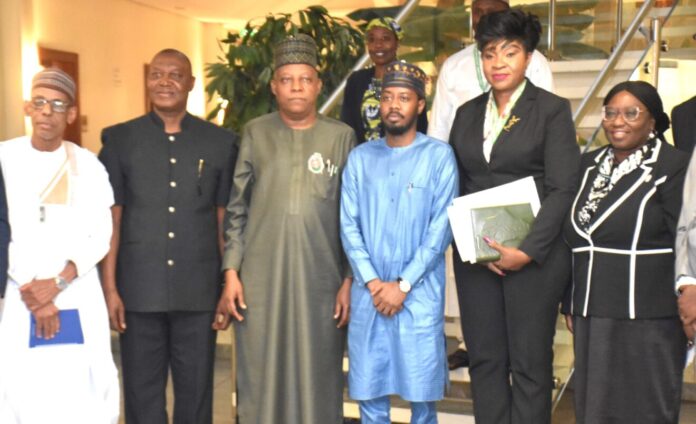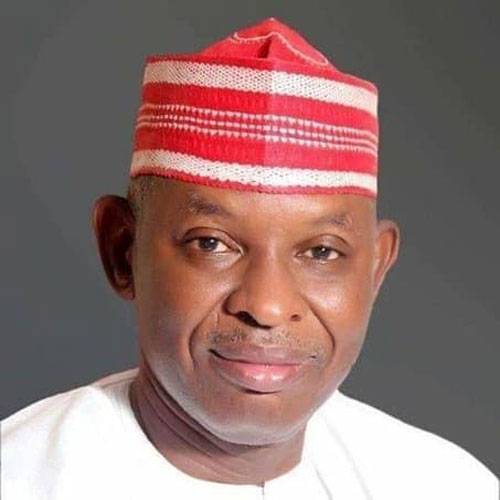The Federal Government has called on international development partners to co-finance phase two of the Special Agro-Industrial Processing Zone known as SAPZ-2 programme.
By Salisu Sani-Idris
The Federal Government has called on international development partners to co-finance phase two of the Special Agro-Industrial Processing Zone known as SAPZ-2 programme.
A statement issued on Friday by the spokesperson of the Vice-President Kashim Shettima, Stanley Nkwocha, said he spoke during the SAPZ-2 programme co-financiers meeting held at the Presidential Villa, Abuja.
The News Agency of Nigeria (NAN) reports that SAPZ programme aims to create new hubs that integrate the production, processing and distribution of targeted crops and livestock to achieve food security.
It will increase incomes, improve livelihoods, and support economic diversification.
The programme spans eight states: Kano, Kaduna, Kwara, Oyo, Ogun, Imo, Cross River, and the Federal Capital Territory (FCT).
Shettima said the programme would be a win-win situation for both Nigeria and the development partners in meeting their development objectives and impacting livelihoods.
The vice-president said that financing the SAPZ-2 programme would accelerate the implementation of the initiative for agro-industrial growth in the country.
Shettima described the project as a game changer for the nation’s economy.
He stated that an accelerated implementation plan for phase one and the on-boarding of the phase-two states would enable President Bola Tinubu’s administration to actualise its food security agenda.
Shettima said, ” This meeting has become imperative to mobilize additional financing for the second phase of the programme to accommodate more States beyond the ten that has been earmarked.
” We currently have a commitment of 600 million dollars from the African Development Bank (AfDB) through a multi-tranche financing arrangement of $200 million per year.
” Similarly, over $300 million from the Arab Bank for Economic Development (BADEA) is expected to be allocated on a 100 million dollars/year basis.”
On the phase one of the programme, he said that it taught a lot of lessons which were helping the government to reshape the programme towards an accelerated delivery,
The vice-president stated that the whole idea would actualise the Tinubu’s administration’s food security agenda.
” With the African Development Bank (AfDB), the SAPZ programme is different from any other programme.
”It has been set on autopilot with the Design, Build and Operate (DBO) model that is set to deliver infrastructure for the processing zones by the end of 2025.
” The accelerated implementation plan for phase one and the on-boarding of the phase-two states will enable us to achieve Mr President’s Food Security Agenda.
” The focus is to set modalities for increased production and processing of cassava, rice,maize, cocoa, tomatoes, and livestock amongst other designated SAPZ priority crops in seven participating states and the FCT for this upcoming dry season,” Shettima said.
He described SAPZ as the agri-business model for Nigeria to diversify its economy through agriculture as well as a platform for development partners to deliver on their developmental objectives across the various SDGs.
Shettima added that the Nigerian government has made it a presidential priority programme and has “kick-started the legal arrangement to institutionalise it as an agency of government for sustainability.
He applauded their commitment to co-finance the initiative together with the Nigerian government.
Shettima also commended AfDB, the International Fund for Agricultural Development (IFAD) and the Islamic Development Bank (IsDB) for their unwavering commitment to ensuring that SAPZ programme delivers on its objective.
Earlier, the National Programme Coordinator, SAPZ, Dr Kabir Yusuf, had said that the project was designed to bolster Nigeria’s agro-industrial development, boost food security and create jobs.
He also said that the project would reduce poverty, in line with President Tinubu’s Renewed Hope Agenda.
” The primary objective is to support sustainable and inclusive agro-industrial development through four components: infrastructure development in agro-industrial hubs, agricultural productivity, policy implementation, and program management.
“For every participating state, we first identify the crop with a competitive and comparative advantage, then support production and agro processing to reduce Nigeria’s 40 per cent post-harvest losses.
” Closing this gap can improve food security by 40 per cent. We provide catalytic infrastructure such as power, access roads, and water treatment plants, significantly reducing operating costs for investors.
” This initiative not only supports agro-industries but also positions Nigeria for sustainable economic diversification,” he added.
Also, the Nigeria Country Director, IFAD, Ms Dede Ekoue, disclosed that the SAPZ-1 had remarkable success in the states.
“We are seeing positive outcomes in Kano, where the lives of smallholder farmers and agro-industries have improved.
” This programme is a federal government priority, aiming to promote inclusive agro-industrialisation, enhance food security, and create jobs. Nigeria’s leadership in this sector can influence the entire continent,” she stated.
For his part, the Director-General, ADB Group’s Nigeria Country Office, Dr Abdul Kamara, described SAPZ as having the highest potential to bring change to Nigeria.
“This comprehensive programme doesn’t just boost production but also creates opportunities for value addition, aligning with president Tinubu’s commitment to food security and youth employment.
” It positions Nigeria to leverage opportunities like the African Continental Free Trade Area (AFCFTA) by adding value to exports beyond national consumption,” Kamara explained.
Also, a member of Nigeria Country Office for the Islamic Development Bank (IsDB), Mr. Daniyar Abylkhan, commended the SAPZ initiative, saying it aligns with the bank’s goals of addressing food insecurity and improving livelihoods.
“Based on the success of the first phase, we are committed to participating in the second phase and ensuring its continued impact,” Abylkhan said.
Other partners present at the meeting included the Federal Ministry of Finance, World Bank, United Nations Development Programme, Japan International Cooperation Agency, Rural Electrification Agency (REA), among others. (NAN)




